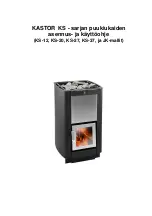
16
HH18Bi 22/04/13
6.0
Safety Notes for your guidance
FIRES CAN BE DANGEROUS
– Always use a fireguard in the presence of children, the elderly or the
infirm.
DO NOT perform modifications to the appliance as this could seriously compromise safety in
operation.
DO NOT OVERFIRE
– it is possible to fire the stove beyond its design capacity, this could damage the
stove, so watch for signs of over firing – if any part of the stove starts to glow red, the fire is in an over fire
situation and the controls should be adjusted accordingly. Never leave the stove unattended for long periods
without first adjusting the controls to a reduced and safe setting – careful air supply control should be
exercised at all times.
WARNING – FUME EMISSION
Properly installed and operated, this appliance will not emit fumes. Occasional fumes from de-ashing and
refuelling may occur which is not normally of serious concern.
However,
persistent fume emission is
potentially dangerous and must not be tolerated.
If fume emission does persist, then the following immediate action should be taken: -
1.
Open doors and windows to ventilate room
2.
Let the fire out, or remove and safely dispose of fuel from the appliance.
3.
Check for flue chimney blockage and clean if required.
4.
Do not attempt to re-light the fire until the cause has been identified and corrected.
If necessary, seek professional advice from chimney or stove specialists.
Important! –
Do not fit an extractor fan in the same room as this appliance.
IN THE EVENT OF A CHIMNEY FIRE
Raise the alarm to let others in the house know.
Call the Fire Brigade
Reduce the appliance-burning rate by closing all air controls fully.
Move furniture and rugs away from the fireplace and remove any nearby ornaments.
Place a fireguard or spark guard in front of the stove.
Feel the chimneybreast for sign of excessive heat.
If the wall is becoming hot, move the furniture away. Ensure that the Fire Brigade can gain access to your
roof space in order to check this area for signs of fire spread.





































